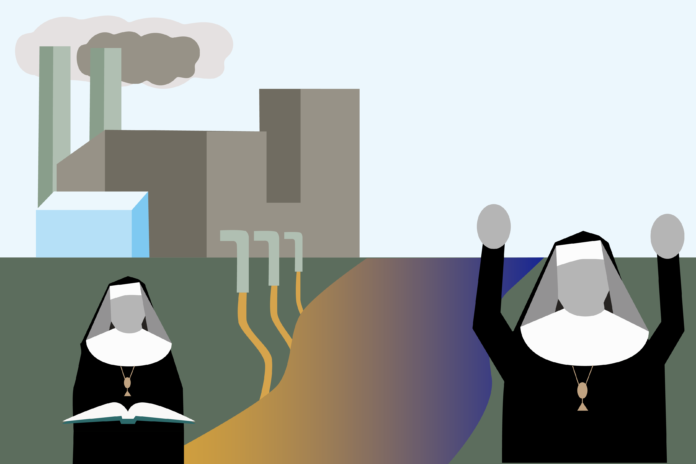Clues to how Amy Coney Barrett might decide cases involving the Clean Water Act
There has been much discussion of how new Supreme Court Justice Amy Coney Barrett’s deep Catholic faith and membership of the Charismatic Christian group “People of Praise” could affect how she might rule on cases involving abortion access and LGBT rights. But there’s another area of law in which her deep religious and moralistic convictions could smuggle their way into her otherwise brilliant legal mind—an area of law that people aren’t talking about as much as they should right now: water law.
The website for “People of Praise” explicitly states that their movement began with beliefs in “charismatic gifts such as speaking in tongues and physical healing, as described in the New Testament book of Acts.” This means that they literally believe that blathering like blatherskites in incomprehensible, unintelligible, meaningless gibberish allows them to talk to God and that faith healing actually can work as a viable alternative to science and medicine. Cool! But this poses some interesting questions on laws and regulations regarding water pollution. And they all hinge on the legal definition of terms like “toxic pollutant” and what it actually means for water to be “polluted” or “impaired.”
Under the Clean Water Act, the term “toxic pollutant” is currently defined as “those pollutants, or combinations of pollutants, including disease-causing agents, which after discharge and upon exposure, ingestion, inhalation or assimilation into any organism, either directly from the environment or indirectly by ingestion through food chains, will, on the basis of information available to the Administrator, cause death, disease, behavioral abnormalities, cancer, genetic mutations, physiological malfunctions (including malfunctions in reproduction) or physical deformations, in such organisms or their offspring.”
In short, “toxic pollutants” are scientifically proven to be harmful to one’s health. It follows that drinking or swimming in “polluted water” would also be harmful to one’s health. But what if, just what if, through the power of faith, we could transform polluted water into holy water? Or if the “toxicity” and “holiness” of any waterway or source of drinking water could exist simultaneously? Well, if any of this is true, I think we’d have to take a real hard look at whether we actually need the Clean Water Act or the Safe Drinking Water Act at all!
Say that a factory discharges harmful toxic chemicals into a river that supplies drinking water and is a favorite place for locals to swim. Using the doctrines and logic of the “People of Praise,” we could easily just have a priest bless the water to make it holy. Problem solved! At least, if you have faith. Or perhaps we’re wrong to even think that the act of polluting water is the negative externality that science has always told us it is—what if discharging toxic sludge into a river or polluting groundwater with fracking chemicals is actually a positive externality, a beautiful sign of industry, corporatism and capitalism as benign forces of the Father, the Son and the Holy Spirit against the Godless wickedness of secularism, socialism and communism?!
By subscribing to this premise, we can easily claim that polluted water is holy water, by definition. And from there, it only makes sense that we should use this water as part of the practice of faith healing. Why shouldn’t people drink or bathe in polluted water if their faith tells them it just might heal them? If people believe that it can heal them, then it would clearly be morally wrong to use the science-prejudiced pretext of “protecting people’s health from harmful pollutants” in order to justify the enforcement of pollution regulations that outright deny people the opportunity to put their faith in the polluted water’s potential healing capabilities, nonexistent as they might be.
Using this faith-based reasoning, it becomes obvious that it’s a MUCH WORSE offense to prevent people from doing something they believe to have positive impacts (despite lacking evidence) than it is to help people avoid something that is scientifically proven to have negative impacts. By reducing faith-based reasoning down to this simple theory, we can clearly see that this is the same genius logic behind the Republican approach to the coronavirus pandemic. And to climate change.
In fact, using this faith-based reasoning to justify ignoring the scientific evidence that supports wearing masks, practicing social distancing and avoiding large crowds—or to justify ignoring the overwhelming scientific evidence of climate change—is perfectly analogous to using faith-based reasoning used to promote “faith healing” over medicine (or as the “People of Praise” like to call it, “physical healing,” which certainly sounds a lot more credible, scientific and less totally f**king bats**t crazy than “faith healing”).
It’s also perfectly analogous to having faith that it’s actually okay to allow big, beautiful, God-fearing corporations to pollute the air and water when there’s scientific evidence that drinking lead-poisoned water for “physical healing” purposes is harmful to human health. Hmm, is “lead-poisoned” the right word? No, how about something like “lead-infused,” or maybe something more neutral and politically correct like “lead-containing”? Or perhaps something with an even more propagandistic, positive and welcoming connotation, like “lead-hospitable”? Yesssss, “lead-hospitable water” it is. It can’t be bad if it’s hospitable, right? Of course not! Just like the church. And this is exactly why Americans should have no problem whatsoever with trusting Barrett to make decisions for them that affect their physical health.
Written by: Benjamin Porter— bbporter@ucdavis.edu
(This article is humor and/or satire, and its content is purely fictional. The story and the names of “sources” are fictionalized)





